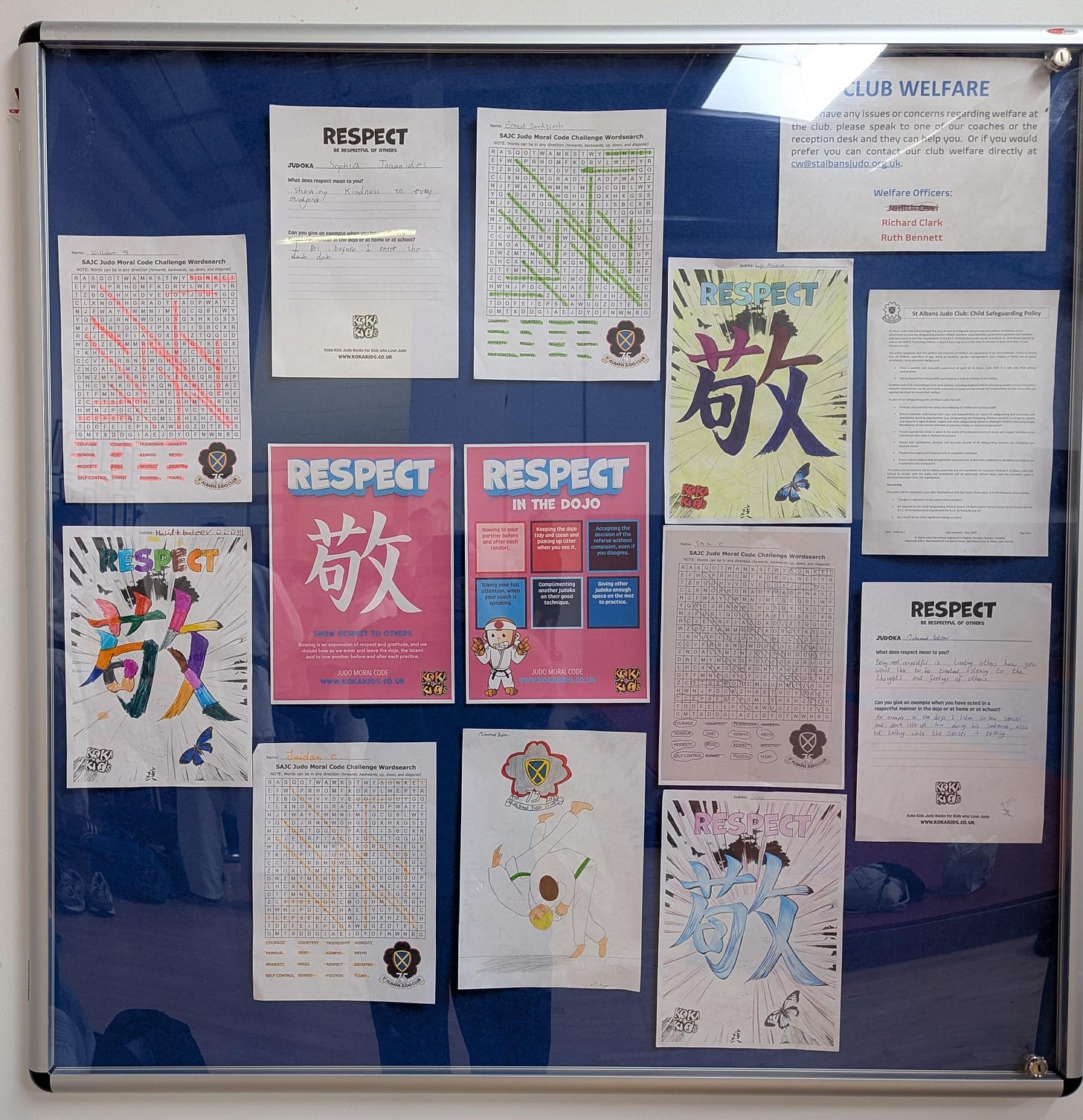The Judo Moral Code: Transforming Dojos and Shaping Character
How Two Coaches are Empowering Young Judoka: New Strategies for Teaching the Moral Code using Koka Kids Resources
I'm thrilled to receive feedback from two coaches on how they are effectively utilising the Koka Kids Moral Code resources in their judo programs.
Specifically, I'd like to highlight the innovative approaches taken by Carmel Judo’s Head Coach Natasha Wolf and St Albans’ Sensei Jad Harris.
Kindly, Natasha and Jad have both allowed me to share their ideas and hopefully they will spark ideas of your own for your own teachings.
For those of you waiting for the final Friendship resources they will be with you on March 31st, when I will also group together the full moral code resource for one easy quick download. This will be available only for those with a paid sub.
You can choose either a free or paid plan:



Sensei Natasha Wolf’s Integrated Approach
Natasha Wolf, head coach of Carmel Judo Club, has integrated the Koka Kids resources into her dojo’s curriculum and the judoka and parents are loving it!
Natasha told me: “The Koka Kids resources have been a very successful way for us to teach the judo moral code, reward and incentivise kids for their progress and learning and build character. The parents of our judokas in kids class have shared that they love that our dojo focuses on character development through teaching these principles. As a parent myself, I know that we all want our children to develop a good character and judo is more than a sport- it is a lifestyle. We encourage our judokas to not only live by these principles in the dojo but outside of it as well.”
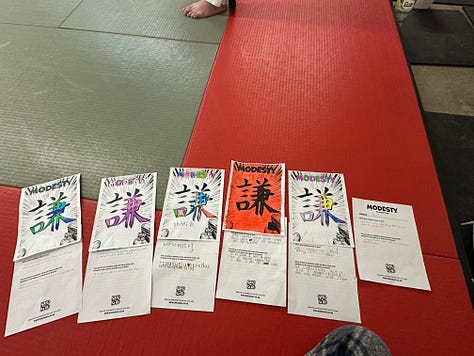

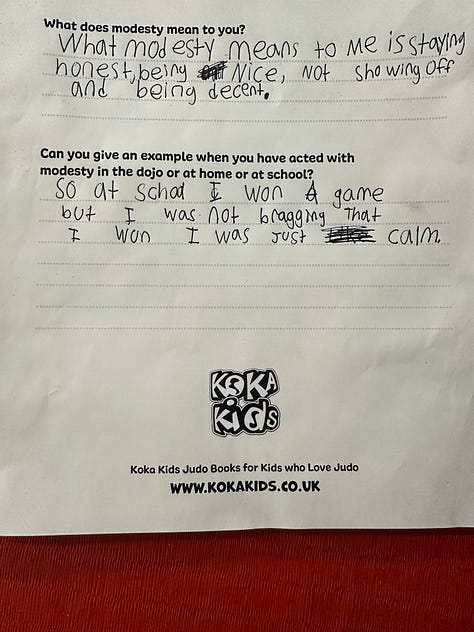
Here’s how Carmel Judo uses the Moral Code Resources:
Homework Assignments: We have found the worksheets to be the most useful tool in terms of resources. We have printed out the worksheet and corresponding coloring page of the kanji and handed them out to students at the end of a class and assigned them as "dojo homework" with a date the following week to bring them back in.
Group Discussions: When we collect the homework from students we have a discussion about that moral code principle. For example, we recently completed the modesty worksheets and I asked students to share what Modesty meant to them. I offered for them to use their paper to read from or to answer aloud from memory, whichever they prefer. They took turns sharing what they wrote and any additional thoughts. We then talked about how they can or have applied that judo moral principle in action inside or outside the dojo. This allows the kids to work on their public speaking skills by sharing in front of the class and helps others to think of other ways they can apply it. I also share what it means to me - and use other examples they haven't mentioned while also providing the students with positive affirmation after they each share. We will continue to talk about the principle even after we move on to the next lesson and connect them to current activities and to show them that they are consistently applying them in the dojo.
Homework Wall: Each judoka in our kids class has a nameplate on the wall with their name written in English and Japanese. We hang up their homework on the wall and they are also encouraged to hang up their Koka Kids certificates as they achieve them. The kids love to showcase and share their work on the coloring pages and the worksheets as well as share their progress certificates. Recently a parent said they enjoy walking by the wall and seeing their child’s work displayed.
Engaging All Learning Styles: By having the worksheets available we are able to engage the kids in another approach to learning. Kids learn through various modalities, having ways to engage kids in multiple ways is key. This allows us to engage all learners and learning styles whether they learn best through visual, auditory, or kinesthetic approaches.
Parent Connection: Parents have made comments about how great it is that we are developing character and not just teaching a martial art. We had a parent recently that said that they liked that our dojo was focusing on teaching the kids principles to live by through the moral code and developing their character.
Sensei Jad Harris’ “Moral Code Challenge”
Jad Harris, Sensei of St Alban Judo Club, has created a comprehensive Moral Code Challenge, which immerses students in the moral code through various ongoing activities.
Jad told me “I absolutely love the resources and I’m just about to roll out the Challenge to all our members using the stickers, dojo posters and worksheets.”
Here’s how St Albans use the Moral Code Resources:
Sticker Reward System: Each child receives a card with spaces for the moral code stickers, and to earn each sticker they will need to complete various tasks.
Interactive Learning: The challenge begins with a word search, with all the Japanese names for each element, introducing the challenge in a fun way.
Age-Appropriate Tasks: To gain each sticker of the moral code, children complete worksheets and either colour or create their own pictures, depending on their age.
In-Class Discussions: In class, we hold short, interactive discussions as we focus on each value of the moral code.
Personal Growth Focus: The “Challenge Yourself” section encourages students to read the “In the Dojo” poster and identify one thing they find most difficult to do, and working on getting better at it over the month, and then discussing what they've done with one of the coaches.
Going Deeper: Then to get a final Certificate & Award for completing the whole challenge, once they have earned all the stickers the judoka will be asked to choose two values to explore deeper. They can choose to do additional drawings, writings, photos or videos to show how they have demonstrated those values in their judo and at home and school.
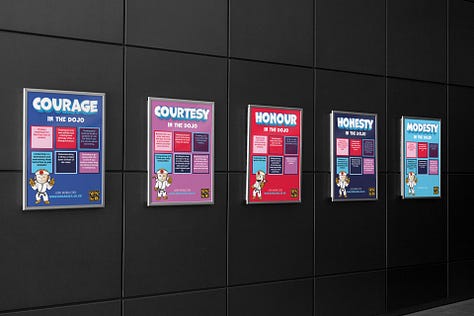

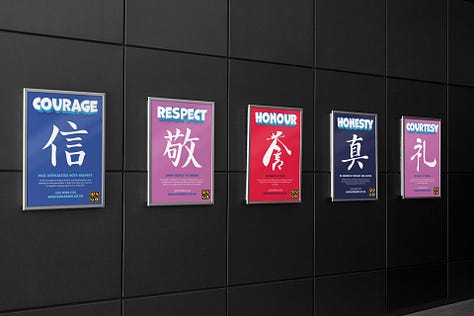
So, what about you?
How will you use these resources to change the world, one judoka at a time?
It's clear that the moral code should be the cornerstone of every dojo and our teaching practices.
What parent doesn’t want to see their child develop and understand the values of respect, honour, courage and self-control?
As we reflect on Jigoro Kano’s vision, we realise that judo is not just a sport; it is a means to nurture individuals so they contribute positively to society, and this journey begins with the moral code.
But the success relies on the coach. Each dojo will have its own ways and methods. But the reality is that it is the coach who leads, often by example, and creates the vibe, the atmosphere as you step onto the mat, and the type of learning environment each dojo becomes.
The question isn't how you'll use these resources. The question is: How will you use these resources to change the world, one judoka at a time?
The goal of these Koka Kids resources? To equip coaches with the necessary visual tools to effectively impart these values. The rest? The rest is down to you.
So, coaches, the mat is yours. Will you just teach judo, or will you create a community of judoka that society can be proud of?
The resources are in your hands. The future is in your dojo. What will you create?
Until next week, have a great week
Nik
Nicola Fairbrother MBE, 8th Dan
- 1992 Olympic Silver Medallist
- 1993 World Champion
- Publisher of Koka Kids children’s judo books




